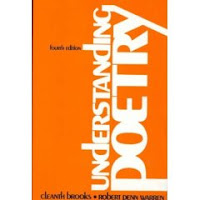 The third edition of the for-the-classroom anthology, Understanding Poetry, by Cleanth Brooks and Robert Penn Warren, was published in 1960. I've made a blog entry here. (The jacket depicted at left is the 60s-style fourth edition. I'll eventually replace it with the third.)
The third edition of the for-the-classroom anthology, Understanding Poetry, by Cleanth Brooks and Robert Penn Warren, was published in 1960. I've made a blog entry here. (The jacket depicted at left is the 60s-style fourth edition. I'll eventually replace it with the third.)What interests me for the moment is the way the editors dictated the order in which a poem of historical or political significance should be treated in the classroom. What was "prior" was the poem as a poem; then and only then could it "offer illumination" as a "document." Such illumination was possible, at least in the abstract, but literary significance must be comprehended first.
And never mind the notion--which, in the late 30s when the first edition was published, was of interest to a number of poets ranging from Reznikoff to Rukeyser to Pound to Norman Rosten--that a poem could consist of documents or be a kind of document itself. I wonder whether the 1960 accounts for this possibility. I'll soon be reading the new preface and will report back.
From the 1960 preface:
[] "Poetry gives us knowledge. It is a knowledge of ourselves, in relation to the world."
[] "[W]e miss the value of poetry if we think of its characteristic knowledge as consisting of 'messages,' statements, snippets of doctrine. The knowledge that poetry yields is available to us only if we submit ourselves to the massive, and subtle, impact of a poem as a whole."
Snippets of doctrine are bad: this of course ignores the entire tradition - yes, by 1960 it's an well-tried manner - of collage, wherein pieces of others' statements can be included in the poem without the assumption of a subject (subject position) necessarily aligned with it.
You can't feel the aura of a poem unless you submit. Submit to what? A thing that is massive and yet subtle. (As opposed to massive and unsubtle, which is the effect of messages, statements and even snippets of doctrine.
Whole: ditto the point about snippets. Wholes, not parts.

 Is '60 the moment when the end of the end of the Old Left had been reached and the New Left began to emerge? Is it the final ascendancy, in certain scenes at least, of poetic postmodernity? Surely the publication of Donald Allen's The New American Poetry that year suggests this, but then again--once again--we look back on "New" here and see continuity. The rhetoric of the Kennedy-Nixon contest made much less of a dent than everyone (at the time as well as since) claimed, so one wonders why were such great claims made?
Is '60 the moment when the end of the end of the Old Left had been reached and the New Left began to emerge? Is it the final ascendancy, in certain scenes at least, of poetic postmodernity? Surely the publication of Donald Allen's The New American Poetry that year suggests this, but then again--once again--we look back on "New" here and see continuity. The rhetoric of the Kennedy-Nixon contest made much less of a dent than everyone (at the time as well as since) claimed, so one wonders why were such great claims made?  Had we come to expect "1960" to be truly ubiquitously modern in a way that the 1950s really were not--not quite? And what specifically does "modern" mean in the Kennedyesque talk then and now about the torch being passed to a new generation, etc.? The First Lady really meant "modernist" when Camelotians said "modern." What about the others across the new young cultural leadership? I've been surprised by how frequently the
Had we come to expect "1960" to be truly ubiquitously modern in a way that the 1950s really were not--not quite? And what specifically does "modern" mean in the Kennedyesque talk then and now about the torch being passed to a new generation, etc.? The First Lady really meant "modernist" when Camelotians said "modern." What about the others across the new young cultural leadership? I've been surprised by how frequently the  "Beat movement" was covered in 1960 in the mainstream press. I was expecting a fair measure but I've found tonnage. 1960 was the year when the figure of the beat was beginning to find acceptance, although still 80% of these stories are mocking, rebels-without-cause condescension. For anyone whose analysis made an impact nationally, do these antipolitical adolescents count as part of the "new young cultural leadership"? No, but rather than the two being opposites, they fall along a Continuum of the New American. Now that's a change for '60.
"Beat movement" was covered in 1960 in the mainstream press. I was expecting a fair measure but I've found tonnage. 1960 was the year when the figure of the beat was beginning to find acceptance, although still 80% of these stories are mocking, rebels-without-cause condescension. For anyone whose analysis made an impact nationally, do these antipolitical adolescents count as part of the "new young cultural leadership"? No, but rather than the two being opposites, they fall along a Continuum of the New American. Now that's a change for '60.







